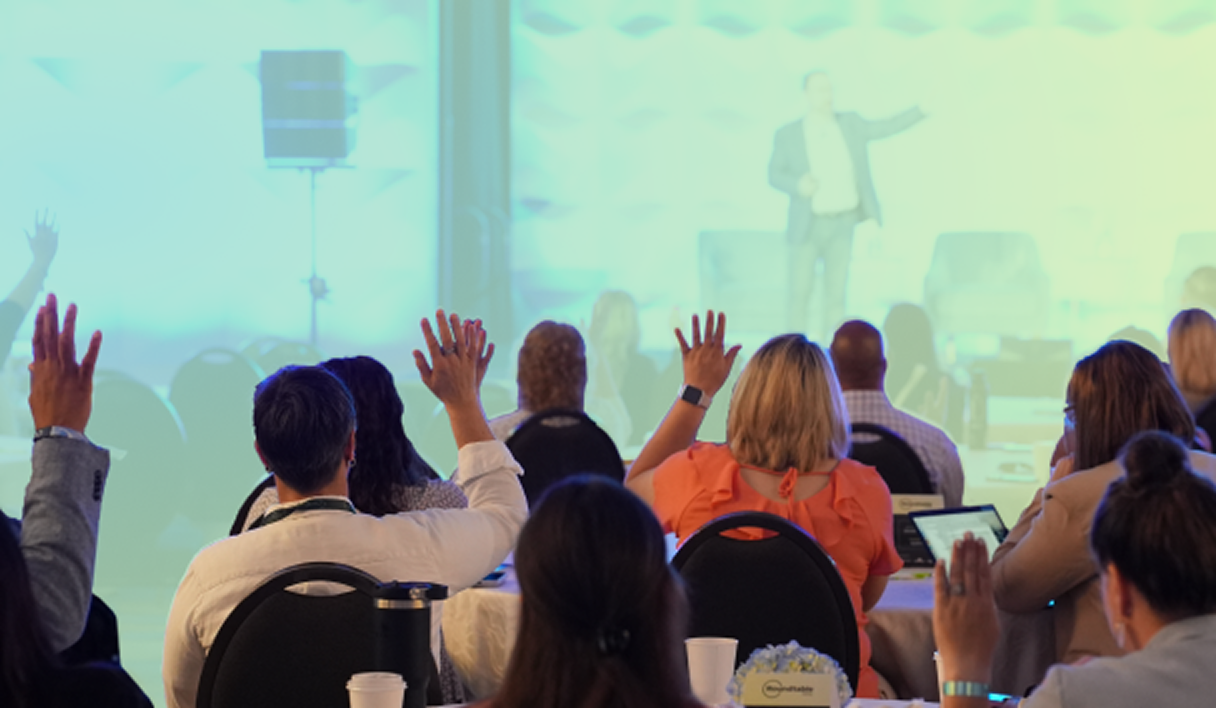Collaboration, Courage, and the Future of the Healthcare Workforce
Roundtable 2025 brought together a uniquely collaborative group—hospital leaders, association partners, vendor agencies and internal Qualivis staff—for two days of discussion, innovation and shared learning. Across every session, one message stood out: navigating today’s workforce challenges takes more than smart strategies. It takes true partnership, bold thinking and a willingness to grow.
Here are five key takeaways from Roundtable 2025:
1. The future of leadership starts with trust and adaptability
In a powerful session led by Dr. Carolyn Swinton, healthcare leaders explored what it means to lead through developing a strong organizational culture and a unifying vision. Leadership isn’t about having all the answers — it’s about creating space for innovation, building trust and cultivating resilience.
Dr. Swinton emphasized the importance of alignment between values and behavior, noting, “When an organization’s core values are clearly defined and align with the behaviors expected of its leaders, it leads to a more cohesive, productive and positive work environment.”
The session emphasized that today’s leaders must balance operational pressure with empathy, adaptability and a deliberate focus on developing the next generation of nurse and executive leaders.
2. Change isn’t the enemy — it’s the catalyst
Keynote speaker, Cassandra Worthy, delivered a deeply engaging and transformative message about navigating constant disruption and change by embracing what she calls “Change Enthusiasm®”: a mental framework that empowers leaders to treat emotional responses to change as useful data rather than distractions.
Worthy shares, “You will find the really big changes, the really big transformations, they never happen to you — they happen for you. To serve you, to serve your evolution to your very best self.”
She also challenged attendees to identify the signs of change and use them to prepare proactively. By shifting mindset and embracing discomfort, organizations can turn moments of disruption into opportunities for growth and momentum.
3. Global talent strategies are gaining momentum
With domestic shortages showing no signs of slowing, international hiring is no longer a future consideration — it’s a present-day strategy. In this session, Christine Coriell of OhioHealth and Qualivis’ own Tiffany Bradley shared how OhioHealth successfully launched an international recruitment initiative.
By prioritizing system-wide communication and intentional onboarding, OhioHealth not only strengthened its workforce but also created a model designed for long-term sustainability and scale. And the clinicians recruited through this initiative brought both clinical expertise and a proven ability to adapt. “These clinicians all have multi-country experience,” said Bradley, “They’ve assimilated into other communities and feel confident about making their move.”
From visa logistics to cultural integration, the session demonstrated how international recruitment can expand talent pipelines, enhance diversity and bring lasting stability to critical roles.
4. Innovation isn’t optional in crisis preparedness
One of the most compelling moments of the event came from Lisa Smithgall’s recounting of Ballad Health’s Hurricane Helene response. Her session highlighted how clear communication, strong command center coordination and flexible staffing helped maintain continuity of care and keep patients and clinicians safe.
Smithgall described how Ballad’s system-wide planning — much of it shaped by lessons from the pandemic — allowed them to act quickly and evacuate three hospitals in just a few days. Even as some staff lost their homes, they continued showing up to care for their communities.
“We knew the community still needed healthcare, so we immediately set up a medical response tent to care for people with injuries, rashes and other emergencies,” said Smithgall.
Smithgall’s story served as a vivid reminder that crisis planning must be proactive, cross-functional and built to scale — long before disaster strikes.
5. Technology and AI can’t replace insight—but they can amplify it
As healthcare systems continue to adopt AI and predictive tech, one theme rang clear: automation without strategy is just noise. Through multiple AI-focused sessions, attendees witnessed how tools like Workforce AI with predictive scheduling and float pool automation are elevating—not replacing—human decision-making. The biggest takeaway? Tech that works is tech that listens—to the data, the users and the mission.
Aya Healthcare’s Chief Product Officer, Jason Drucker, said it like this, “Part of the opportunity of achieving generative AI, which is fantastic, requires us to lay the foundation of well-structured data. That’s the work we should be doing right now.”
Looking Ahead
As the healthcare workforce continues to evolve, Roundtable 2025 left one thing clear: real progress happens when we work together. Whether through thought-provoking panels, candid roundtable discussions or casual hallway conversations, this year’s event sparked ideas and relationships that will shape how hospitals prepare, plan and thrive.
To everyone who contributed to this year’s event—thank you. We’re inspired by your insight, grounded by your experience and energized to keep the conversation going in the months ahead.
